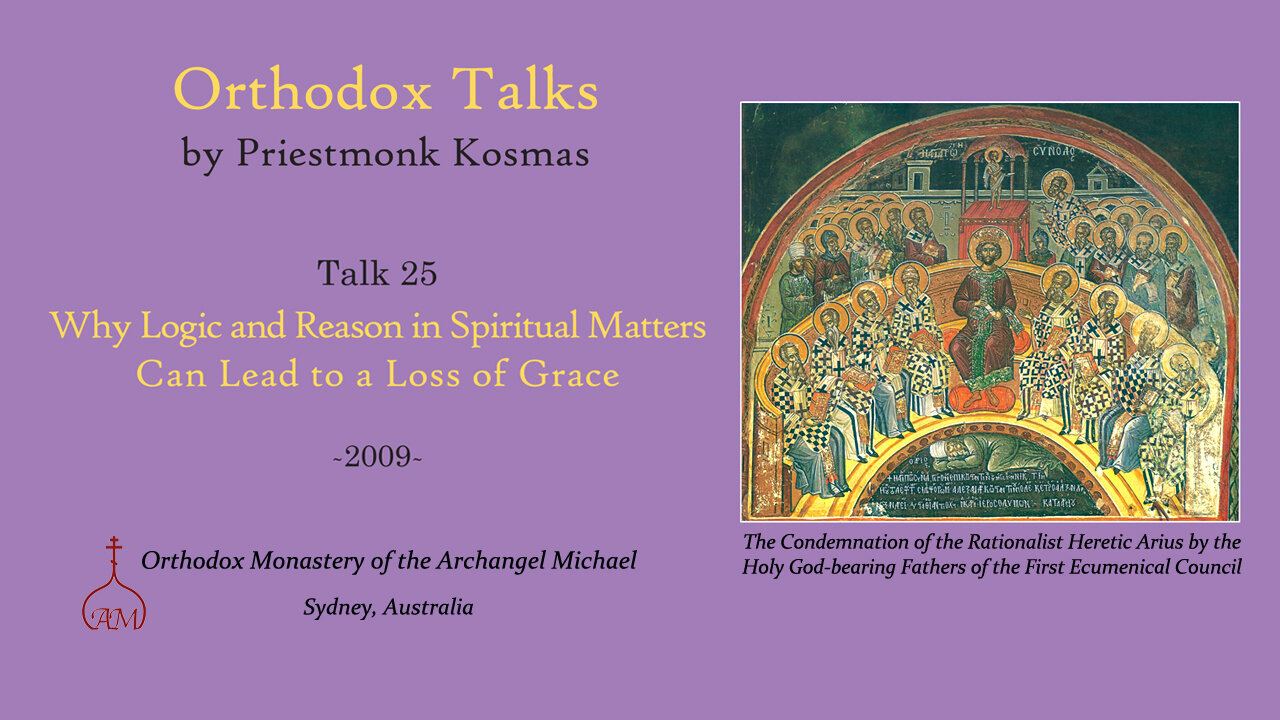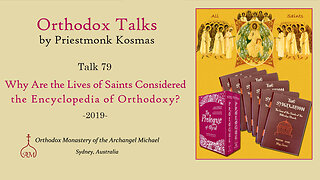Premium Only Content

Talk 25: Why Logic and Reason in Spiritual Matters Can Lead to a Loss of Grace
Orthodox Talks by Priestmonk Kosmas, Sydney, Australia
iTunes: https://podcasts.apple.com/us/podcast/orthodox-talks/id1659252607
Spotify: https://open.spotify.com/show/0sKZoGUhAjJua9RtjoZS73
RSS Feed: https://media.rss.com/orthodoxtalks/feed.xml
This talk is a continuation of Talk 24: "Elders vs. Religious Intellectuals: Whom to Follow?" Asceticism is the most important aspect of Orthodox spirituality, for it is the path by which one acquires the grace of God. But the holy elders of our times teach that today there is a lack, and even an absence, of asceticism in the Church. Without asceticism, Christians tend to ignore the heart and the conscience, and instead use logic and reason in spiritual matters. The question then arises: what is true asceticism?
In this talk, Father Kosmas explains that true asceticism is the struggle to keep the commandments of Christ, not simply following various external rules and abstaining from certain foods. He goes on to list many aspects of everyday life that can be considered ascetical and are therefore spiritually beneficial. By struggling to keep the commandments, one can acquire grace and thereby avoid the pitfall of using logic and reason in spiritual matters. For as we read in Holy Scripture, the Holy Spirit only abides in those who keep Christ’s commandments.
The following questions are also discussed: why did Elder Paisios call those clerics sick who used psychology to help souls? What should be our attitude towards atheists? Why are Christians who complain about the evil in the world called “saltless”? How does God humble the proud? Should we condemn drug addicts, prostitutes, fornicators, homosexuals, alcoholics, etc.? Why are priests increasingly referring their spiritual children to psychologists? How should we view abuse of men by women?
Other points covered in this talk include: an “illogical” explanation for the death of infants and children; how studies in academic theology can produce unbelievers; how mental illness can be viewed as a spiritual struggle and even martyrdom; how spiritual progress comes when we stop focusing on our personal problems; and the wonderful example of a woman who endured abuse from her husband.
-
 4:07:02
4:07:02
Orthodox Talks
1 year agoTalk 79: Why Are the Lives of Saints Considered the Encyclopedia of Orthodoxy?
1.62K1 -
 4:27
4:27
Reforge Gaming
8 hours agoTHIS will not save Ubisoft.
3911 -
 7:35
7:35
Tactical Advisor
1 day agoNEW Springfield Prodigy Compact (FIRST LOOK)
1.27K -
 16:45
16:45
IsaacButterfield
1 day ago $0.25 earnedWoke TikToks Are DESTROYING The World
2.16K8 -
 1:09:27
1:09:27
State of the Second Podcast
13 hours agoThis is Why We Don’t Trust Politicians (ft. @stones2ndsense)
893 -
 10:19
10:19
Chrissy Clark
9 hours agoCNN’s BILLION Dollar Defamation Trial
1.18K -
 1:00:27
1:00:27
Trumpet Daily
17 hours ago $3.41 earnedCongress Humiliates Itself - Trumpet Daily | Jan. 15, 2025
4.08K9 -
 1:49:46
1:49:46
Glenn Greenwald
1 day agoTrump Fosters A Peace Deal With Israel & Gaza; Trump's Pressure On Israel Embarrasses His Enemies & Provides Foreign Policy Clues; Rubio & Hegseth On War And Militarism | SYSTEM UPDATE #389
89.9K159 -
 1:28:46
1:28:46
Donald Trump Jr.
16 hours agoOut of this World: Breaking News Investigation on Secret Alien Aircrafts, Live with Ross Coulthart & Lue Elizondo | TRIGGERED Ep.207
305K446 -
 1:39:31
1:39:31
Space Ice
12 hours agoSpace Ice & Redeye: Battlefield Earth & Rob Schneider
71.6K4